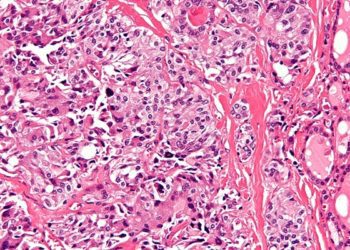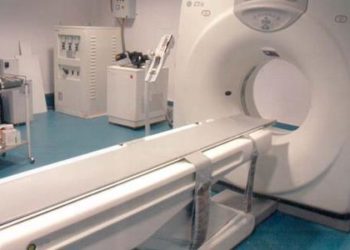Radiation may have a role treating brain metastases from lung cancer
Image: PD
1. There was no difference in overall survival of patients with brain metastases from EGFR-mutant lung adenocarcinoma receiving either whole brain radiotherapy (WBRT) or erlotinib.
2. Whole brain radiation delayed intracranial progression of metastases as compared to treatment with erlotinib.
Evidence rating: 3 (Fair)
Study Rundown: The use of EGFR tyrosine kinase inhibitors (TKI), such as erlotinib, has been shown to increase survival compared to traditional chemotherapy in metastatic lung cancer with proven EGFR mutations. However, because of relatively low rates of intracranial spread in EGFR-mutant lung cancers, the primary use of erlotinib over WBRT remains controversial. In this study, the authors reviewed 110 cases of newly diagnosed EGFR-mutant lung adenocarcinoma that were treated with erlotinib, whole brain radiation, or stereotactic radiosurgery. They found that overall survival was similar between erlotinib and whole brain radiation treatment groups. For a minority of patients treated with radiosurgery, survival was actually increased as compared to treatment with erlotinib. Furthermore, whole brain radiation significantly delayed the time to intracranial metastatic progression as compared to erlotinib treatment. This trial was limited in its design as a retrospective cohort study of the experience from a single institution. While the cohorts were matched in terms of age, sex, cancer stage, smoking status, and graded prognostic assessment, comparisons were also limited by significant biases in qualitative and quantitative extent of metastatic disease.
Click to read the study in The International Journal of Radiation Oncology
Relevant reading: Rational, biologically based treatment of EGFR-mutant non-small-cell lung cancer
In Depth [retrospective review]: In this retrospective review, 110 patients with EGFR-mutant lung adenocarnicoma were identified and included in a matched, tripartite comparison. All patients were treated at a single institution and were EGFR-RKI naïve. 63 were treated with erlotinib, 32 with whole brain radiotherapy, and the remaining 15 with stereotactic radiosurgery. The median follow-up time for all patients was 20 months. Primary outcomes were overall survival from diagnosis and time to progression of intracranial metastases. The median overall survival for the patients in the WBRT cohort was 35 months as compared to 26 months for those in the erlotinib cohort (P=0.62). The median overall survival for patients in the stereotactic radiosurgery cohort was 64 months, which was significantly longer compared to the erlotinib cohort (P=0.006). However, part of this difference was confounded by longer overall survival in the 15 patients treated with radiosurgery, who had a higher graded prognostic assessment compared to patients in the erlotinib group at baseline. Patients on WBRT had a median time to intracranial progression of disease of 24 months compared to 16 months for those treated with erlotinib (P=0.04). In this study, overall survival and disease progression were estimated with the Kaplan-Meier method. Comparisons were made using χ2 or Fisher exact test.
More from this author: Erlotinib does not demonstrate increased survival in ovarian epithelial carcinomas, Afatinib shows increased progression-free survival in non-small-cell lung cancer, Slight increased risk of intussusception linked to rotavirus vaccination, Escalated-dose radiotherapy did not increase survival in prostate cancer
©2012-2014 2minutemedicine.com. All rights reserved. No works may be reproduced without expressed written consent from 2minutemedicine.com. Disclaimer: We present factual information directly from peer reviewed medical journals. No post should be construed as medical advice and is not intended as such by the authors, editors, staff or by 2minutemedicine.com. PLEASE SEE A HEALTHCARE PROVIDER IN YOUR AREA IF YOU SEEK MEDICAL ADVICE OF ANY SORT.









